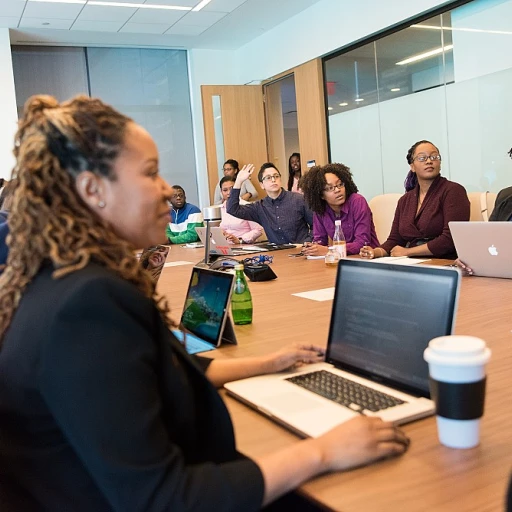
Understanding the Role of a Facilitator in Candidate Sourcing
The Crucial Role of Facilitation in Candidate Sourcing
Facilitation stands as a pivotal element in enhancing the effectiveness of candidate sourcing. As organizations look to attract top talent, the role of a facilitator becomes integral in crafting a cohesive and productive sourcing strategy. Facilitators operate at the heart of successful candidate sourcing efforts, guiding teams towards common objectives, fostering an inclusive environment, and ensuring efficient decision-making.
In the realm of candidate sourcing, facilitators leverage their skills to create dynamic learning environments where sourcing team members can explore innovative ideas and strategies. Facilitators help participants to face challenges collaboratively while keeping the group session focused on meeting facilitation. Their impact on fostering effective teamwork cannot be underestimated, as it directly influences the quality of candidates identified.
Moreover, facilitators bring immense value by customizing approaches to suit the diverse needs of sourcing teams. Whether through online courses or face-to-face training sessions, they employ a combination of facilitation techniques to nurture an engaging and productive learning experience.
Facilitator training tailored for candidate sourcing involves developing a range of facilitation skills crucial for the role, such as leadership, communication, and strategic planning. Participants gain insights into effective workshop planning and emerge as adept facilitators who can lead training sessions with confidence.
The effectiveness of a facilitator is not only in their ability to manage a group but also in their commitment to continuous professional development. As facilitators pursue certification programs and additional facilitator training courses, they hone their expertise further, affirming their ability to adapt to evolving demands within sourcing frameworks.
Key Skills for Effective Facilitator Training
Developing Crucial Abilities for Facilitation
In the realm of candidate sourcing, possessing comprehensive facilitation skills is indispensable. Facilitators play an integral role in guiding teams toward identifying top talent. Elevating these skills through effective training is crucial for ensuring success in this domain. Participants in facilitation courses will gain essential tools designed to enhance their effectiveness in sourcing activities. A key aspect of facilitator training is to hone communication skills. Experienced facilitators must learn to engage with diverse participants, ensuring that diverse opinions and ideas within a group can be heard and valued. The ability to communicate clearly and succinctly is paramount in steering meetings and sourcing discussions. Another vital skill is effective meeting facilitation. Facilitators coach participants on conducting successful sessions, whether they are face-to-face workshops or virtual facilitator-led courses. Training programs should emphasize setting clear agendas, guiding discussions, and achieving desired outcomes efficiently. These abilities are crucial in maintaining a productive learning environment. Leadership qualities are also heavily emphasized in facilitation training. Facilitators often exhibit leadership by example, directing group dynamics and promoting a collaborative atmosphere. Effective leadership skills can foster an open environment where every participant feels encouraged to contribute, thus enriching sourcing strategies. Facilitation courses frequently provide exposure to various facilitation techniques and methodologies. In doing so, they broaden facilitators' perspectives and allow them to tailor their approach to the specific needs of the session. Mastery of different facilitation techniques is a significant asset in crafting bespoke sessions that resonate with the group’s unique challenges and goals. Additionally, professional development through continued learning experiences and facilitator certification programs ensures that facilitators maintain relevance and expertise in evolving sourcing methodologies. By committing to ongoing education, facilitators can thrive in dynamic environments, adapting to new trends and technologies in sourcing. Unlocking the secrets to identifying top talent requires facilitators to excel in these key skills. By investing in thorough training, facilitators empower themselves to lead efficient and productive sourcing processes, bolstering the overall effectiveness of their organizations.Designing a Comprehensive Facilitator Training Program
Structuring a Tailored Learning Experience
Designing a comprehensive facilitator training program requires a strategic approach that combines both theoretical and practical elements. A well-structured training course is essential in developing facilitation skills that not only enhance individual performance but also inspire effective leadership within a group.- Understanding the Audience: One of the first steps in designing a facilitator training program is to identify the needs and expectations of your participants. By analyzing their current skills and knowledge gaps, you can tailor a program that meets their professional development goals.
- Blending Learning Modalities: Incorporating a mix of online course materials and face-to-face workshops can enrich the learning environment. Virtual facilitator sessions offer flexibility and convenience, while in-person training facilitation encourages real-time interaction and engagement.
- Incorporating Leadership and Facilitation Techniques: Effective courses should contain modules that focus on building facilitation leadership skills. Participants should learn key facilitation techniques and strategies for session management, ensuring that they can handle diverse group dynamics during live sessions.
- Utilizing Technology: Technology plays a pivotal role in modern facilitator training. Integrating tools such as virtual learning platforms can enhance the scope and reach of your program, making learning experiences more interactive and accessible. For more on how technology intersects with mental health support in HR, explore this guide on HR integrations.
- Certification and Continuous Evaluation: Offering a certification program at the completion of training sessions provides participants with a tangible recognition of their skills. Regular evaluations and feedback mechanisms ensure that your training course remains effective and relevant, facilitating continuous improvement in facilitation skills.
Utilizing Technology in Facilitator Training
Leveraging Digital Tools in Training
In today's digital era, the inclusion of technology in training facilitation has become indispensable. Online courses and virtual facilitator programs have gained traction, providing a flexible learning environment that accommodates diverse schedules. Through these platforms, participants can engage in training sessions remotely, allowing for a more convenient and accessible pathway to acquiring facilitation skills.Interactive Learning Platforms
Facilitator training courses can be enhanced using interactive online tools that mimic face-to-face interactions. By utilizing webinars, video conferencing, and virtual breakout rooms, facilitators can create an engaging virtual workshop experience. These methods enable participants to practice facilitation techniques in real time, fostering a more effective learning experience.Integrating Multimedia Resources
Incorporating multimedia resources, such as instructional videos and interactive modules, can significantly enhance the learning experience. These resources allow trainees to learn at their own pace and revisit complex concepts, further cementing their understanding. The combination of visual and auditory content not only enriches the learning process but also aids in the long-term retention of facilitation skills.Utilizing Feedback Tools
Effective facilitator training also relies on continuous feedback. Digital feedback tools facilitate the collection of participant responses and evaluations, which can be instrumental in assessing the course effectiveness. By gathering insights into the training's impact, facilitators can adjust their approach to better meet the group's needs, ultimately improving overall professional development outcomes.Adaptive Learning Technologies
Adaptive learning technologies are making waves in facilitation training by personalizing the learning journey. These systems analyze individual progress and style, adapting the course content to meet each participant's unique needs. Through this tailored approach, participants can achieve a deeper understanding, leading to enhanced leadership and meeting facilitation skills. Integrating technology into facilitation courses not only modernizes training sessions but also ensures that facilitators are better equipped to face challenges in dynamic learning environments.Evaluating the Success of Facilitator Training
Measuring the Impact of Facilitator Training
Evaluating the success of facilitator training is crucial to ensure that the skills and techniques imparted are effectively enhancing the participants' abilities. A structured approach to assessment can help in identifying areas of improvement and reinforcing strengths.
Feedback from Participants
Gathering feedback from participants is a fundamental step in evaluating training effectiveness. Facilitators can use surveys and feedback forms at the end of each session to collect insights on the training courses. This feedback can reveal how well the facilitation techniques were received and whether the learning environment was conducive to professional development.
Assessing Skill Application
Another method to evaluate the success of facilitator training is by observing how participants apply their newly acquired skills in real-world settings. This can be done through follow-up sessions or by monitoring their performance in group meetings and workshops. The ability to effectively lead a session or engage a group is a strong indicator of successful training.
Utilizing Technology for Evaluation
Technology can play a significant role in evaluating facilitator training. Online platforms can track participants' progress through virtual facilitator courses, providing data on their engagement and learning outcomes. This information can be invaluable in refining training programs and ensuring they meet the needs of facilitators.
Continuous Feedback Loop
Creating a continuous feedback loop is essential for ongoing improvement in facilitator training. Regularly updating the training course content based on feedback and performance assessments ensures that the courses remain relevant and effective. This approach not only enhances the skills of facilitators but also contributes to the overall success of candidate sourcing initiatives.
Continuous Improvement in Facilitator Training
Fostering an Environment for Ongoing Learning and Growth
Encouraging continuous improvement in facilitation training is paramount for developing competent facilitators. As facilitators, embracing lifelong learning ensures the ability to adapt to evolving methodologies and adds value to each training session. Here are some strategies to promote ongoing professional development:- Regular Skill Refreshment: Just as participants engage in recurring sessions to hone their skills, facilitators should partake in refresher courses. This helps in staying updated with new facilitation techniques and trends within the facilitation community.
- Feedback Loops: Creating an effective feedback mechanism is vital. Encouraging participants to provide constructive criticism after sessions can lead to significant improvements in facilitation skills. Such feedback ensures facilitators tailor their approach to the needs of the group.
- Incorporating New Technologies: Add new dimensions to your learning experiences by incorporating online course components. The use of virtual facilitator environments enables an adaptive and broader approach to professional development, which aligns well with modern learning preferences.
- Peer Collaboration: Facilitators can greatly benefit from engaging with peers through group discussions or professional development workshops. Sharing experiences and strategies strengthens facilitation leadership and fosters a supportive network.
- Monitoring Progress: Regular evaluation sessions to review the outcomes of facilitation training promote a deeper understanding of areas that need enhancement. This introspection is essential for maintaining a high standard of facilitator training.
- Certification and Recognition: Earning facilitator certification not only validates skills but also encourages a professional commitment to ongoing development. Certification programs can inspire confidence in facilitators, improving the credibility of training facilitation efforts.













